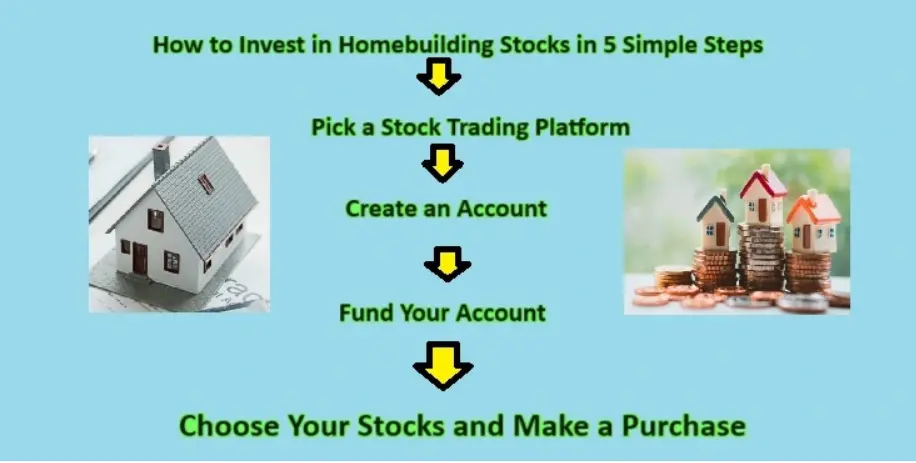Today our experts shared the 4 Top Homebuilder Stocks To Buy in 2024 starting with DR Horton (DHI), Lennar Corp (LEN), PulteGroup (PHM), and NVR Inc. (NVR).
Still confused as to Why Investors Are Suddenly Bullish on Construction Stocks in 2024? Let us discover why investors should consider buying these fundamentally strong homebuilder stocks listed on the New York Stock Exchange (NYSE) based on their marketcap, current performance, and historical growth over the past 10 years.
Below is the list of the 4 best public home builder stocks in the United States that are well-positioned for long-term growth with their extensive research.
Table of Contents
List of 4 Top Homebuilder Stocks To Buy in 2024
Also Read: NVR Stock Forecast 2025 Price Prediction for 2030, 2040
Why Invest in Homebuilder Stocks in 2024?

- High Demand for Homes: There’s a strong demand for new homes, even though there are more homes for sale now than before. In April, there were 1.52 million homes for sale in the U.S., which is still below the historical average of $2.36 million. This gap means there’s plenty of room for growth in the homebuilding market.
- Declining Mortgage Rates: As mortgage rates drop from their peak, more people can afford to buy homes. This likely increase in home purchases will benefit homebuilders.
- Industry Growth: The homebuilding industry is growing steadily, helping to shape communities and adapt to what homeowners want and need.
Considering these factors, investing in strong homebuilder stocks like DR Horton Inc (DHI), PulteGroup, Inc. (PHM), NVR Inc. (NVR), and Lennar Corp (LEN) could be a wise decision for 2024.
What are the main reasons for Growing Interest in Homebuilder Stocks?

Surging Builder Confidence
Builder sentiment for newly constructed single-family homes has surged past expectations. The National Association of Home Builders (NAHB) reported a sentiment reading of 51 in March, exceeding the forecast of 48. This bullish sentiment indicates confidence in the housing market, driven by declining mortgage rates and a scarcity of existing homes for sale. This positive trend has attracted investors to homebuilder stocks as growth opportunities.
Housing Starts Exceed Forecasts
Housing starts consistently surpass economists’ forecasts, indicating a strong homebuilder construction market. In the latest report, new housing starts rose to 1.52 million, a 10.7% increase compared to January. New permits, showing approved projects, also increased by 1.9%. This suggests a continued acceleration in new construction, keeping homebuilder stocks in the spotlight. The actual numbers exceeded initial projections of 1.45 million starts and 1.5 million permits, leading to a positive market response.
Impact of Lower Interest Rates on the Housing Market
Lower interest rates are beneficial for the housing industry. The “lock-in effect,” where homeowners are reluctant to sell their low-interest-rate mortgages, diminishes as mortgage rates fall. The Federal Home Financing Association (FHFA) study showed that the likelihood of selling decreases by 18% for each one-percentage-point increase in mortgage rates. With rates dropping below 7% from a peak of around 8%, more homeowners are willing to sell, boosting home sales and benefiting homebuilder stocks.
Capitalizing on the Housing Market
Given these positive trends, investing in strong homebuilder stocks like DR Horton Inc (DHI), PulteGroup, Inc. (PHM), NVR Inc. (NVR), and Lennar Corp (LEN) could be a wise decision for 2024. These companies are well-positioned to capitalize on the growing housing market, making them attractive investment options.
Potential Risks and Challenges Facing Homebuilding Stocks in 2024
Homebuilder stocks, which include companies like DR Horton, Lennar Corp, PulteGroup, and NVR, have faced many risks and challenges this year. Investing in these stocks involves risk, including the potential loss of capital.
The companies after significant gains in recent years, their performance has dipped since March. As of Friday afternoon, NVR (NVR) was down 11%, Lennar (LEN) 13.5%, DR Horton (DHI) 14.5%, and PulteGroup (17.3%) compared to a healthy 8 percent gain for the broader S&P 500 during the same period.
The U.S. housing market is cooling down. Data shows a 16.3% increase in available housing inventory in April, reaching 1.21 million units. New home sales fell 4.7% in April to an annual rate of 634,000 units, down 7.7% from last year. In May, existing home sales slowed, but prices rose.
Rising mortgage rates are likely causing the decline in sales, as they make homeownership more expensive. Homeowners with low rates are reluctant to move. A June study by Redfin found that 62% of loans are fixed below 4% and 82.4% are fixed below 5%. This “lock-in effect” is affecting demand.
Key Metrics to Consider When Evaluating Homebuilder Stocks
Real estate investing metrics are essential tools for investors making buy or sell decisions on properties. These metrics not only guide investment choices but also serve as performance indicators, helping you spot and address issues before they escalate. Each financial ratio mentioned below reveals distinct insights into the health of your business or property, offering a comprehensive view of potential opportunities and risks.
Net Operating Income (NOI)
What It Is: Measures the income from a property minus operating expenses (excluding mortgage payments).
Why It Matters: Shows if the property generates enough income to cover costs and helps assess profitability.
2. Capitalization Rate (Cap Rate)
What It Is: The ratio of NOI to the property’s value or purchase price.
Why It Matters: Indicates the potential return on investment and helps compare different properties. A higher cap rate means higher returns but also higher risk.
3. Cash Flow
What It Is: The money left after paying all expenses from the rent you receive.
Why It Matters: Shows if you’re making or losing money each month. Positive cash flow means the property is profitable.
4. Internal Rate of Return (IRR)
What It Is: Estimates the potential annual return on your investment over time, including future cash flows.
Why It Matters: Helps evaluate the long-term profitability of a property and compare it with other investments.
5. Loan to Value Ratio (LTV Ratio)
What It Is: The ratio of the loan amount to the property’s value.
Why It Matters: Indicates how much of the property’s value is financed. A lower LTV ratio means less risk and a stronger financial position.
Overview of the Homebuilding Industry in 2024
The construction industry in the United States recorded 2024 on a high note, with an 8% potential gain in all major segments. The mid-year 2024 will likely be a good time to grow your money in homebuilding stocks. On the residential side, single-family homebuilding will bring growth at a modest or moderate rate, more than casting a narrow decline in apartment complex construction.
Housing Market Outlook for Builders Seem Bullish in 2024
Builders are optimistic about the housing market for 2024. The number of new single-family homes being built is expected to grow by 4.7% in 2024 and 4.2% in 2025. By 2025, the rate of new single-family home construction is anticipated to reach 1.3 million homes per year.
Despite the growth, experts believe more homes need to be built. To fulfill the shortage of homes in the U.S., builders should aim to build over 1.15 million homes annually. Builders are optimistic about increased construction activity, but they also face hurdles like high costs, material shortages, and regulatory expenses that are limiting their ability to meet the growing demand for new homes.
How to Invest in Homebuilder Stocks in 5 Simple Steps

Pick a Stock Trading Platform: Start by selecting an online platform for trading stocks. You can choose from our top recommendations, use the TipRanks comparison table, or directly explore the best stock trading apps of 2024.
Create an Account: Sign up by filling out your personal information to create your trading account.
Fund Your Account: Link your bank account and deposit the funds needed for your investments.
Choose Your Stocks: Search for the homebuilding stocks you’re interested in by name or ticker symbol, such as NVR or DHI.
Make Your Purchase: Place an order to buy the stock. It’s easy!
What Homebuilder Stocks Are People Buying in 2024?
Several leading homebuilder stocks are poised to benefit from the surge in new construction and heightened market optimism. Our list of each key player in homebuilding stock has received MODERATE BUY ratings due to their brilliant past performance.
DR Horton (DHI) Stock
DR Horton Inc (NYSE: DHI) is a leading homebuilder in the United States, renowned for its quality construction and extensive market reach. Investors should consider DR Horton for its market leadership, strong financials, and proven track record of growth. The company’s ability to adapt to market changes and its focus on delivering quality homes make it a solid investment choice.
Market Capitalization and Financial Health
With a market cap of $44.80B, DR Horton stands out as a giant in the homebuilding industry. The company’s strong financial health is reflected in its consistent performance and robust balance sheet. DR Horton has demonstrated impressive growth over the past decade, with consistent revenue and profit increases year over year.
Current Performance and Historical Growth
| Company | DR Horton (DHI) |
|---|---|
| Open | $134.44 |
| High | $137.77 |
| Low | $134.43 |
| Market Cap | $44.80B |
| P/E Ratio | 9.26 |
| Dividend Yield | 0.88% |
| CDP Score | C |
| 52-Week High | $165.75 |
| 52-Week Low | $100.08 |
Why Invest in DR Horton?
Investors should consider DR Horton for its market leadership, strong financials, and proven track record of growth. The company’s ability to adapt to market changes and its focus on delivering quality homes make it a solid investment choice.
1. Strong Financial Performance: DR Horton makes a lot of money, with $37.1 billion in the last year and good profits. Their sales grew by 14.2% recently, and experts think they will earn $14.196 per share this year.
2. Attractive Dividend Yield: DR Horton pays dividends, giving shareholders a 0.8% return. This means you can earn money regularly from your investment.
3. Commitment to Quality and Innovation: DR Horton builds homes with great designs, energy-saving features, and strong warranties. They focus on making high-quality homes that people love.
4. Strategic Land Investments: They buy and develop land in popular areas, ensuring they have the best locations for building new homes.
5. Optimized Pricing and Sales Strategies: DHI carefully sets prices and offers incentives to maximize profits and stay competitive in the market.
6. Solid Analyst Ratings: Experts rate DHI as a solid investment with good value and growth potential. It’s considered a stable choice for investors.
PulteGroup (PHM) Stock Overview
PulteGroup, Inc. is a major player in the homebuilding industry. The company is involved in several key areas:
- Homebuilding: PulteGroup designs and builds new homes across the United States. They offer a range of home styles and features under brands like Centex, Pulte Homes, Del Webb, DiVosta Homes, American West, and John Wieland Homes and Neighborhoods.
- Mortgage Banking: They provide mortgage financing solutions for homebuyers.
- Title and Insurance Brokerage: PulteGroup also offers title and insurance services related to home purchases.
Business Segments:
- Homebuilding: This segment focuses on acquiring land, constructing homes, and selling them to customers.
- Financial Services: This segment handles mortgage lending, title insurance, and other related services for homebuyers.
Market Capitalization and Financial Health
PulteGroup (NYSE), with a market capitalization of $23.67 billion, is the largest of the top three homebuilder stocks you should consider. The company shows strong financial health with positive gross profit, a 22% average ROIC over three years, a high 31% average ROE, and a low D/E ratio of 0.23.
Key Financial Highlights:
- Earnings Per Share: Increased by 32% to $3.10.
- Net New Orders: Rose 14% to 8,379 homes.
- Unit Backlog: 13,430 homes, with an average price of $610,573.
- Cash and Debt: PHM ended the quarter with $1.8 billion in cash and $1.96 billion in long-term debt, resulting in a low net debt of $191 million, or just 1.7% of its total capital.
Performance Metrics:
- Trailing-12-Month EBIT Margin: 21.17%, well above the industry average of 7.60%.
- Trailing-12-Month EBITDA Margin: 21.63%, nearly double the industry average of 10.91%.
- Trailing-12-Month Return on Total Capital: 19.23%, significantly higher than the industry average of 6.05%.
Recent Results and Future Outlook:
For Q3 2023, PulteGroup’s revenue increased 2.8% to $4 billion, with net income rising by 1.7% to $638.78 million and EPS growing by 7.8% to $2.90.
Looking ahead, analysts expect a slight revenue increase of 0.3% to $4.20 billion for the quarter ending June 30, 2024, and a 5.9% EPS growth for the fiscal year ending December 31, 2023.
Stock Performance:
Over the past nine months, PulteGroup’s stock has surged 77.1%, closing at $105.82 in the last trading session.
Stock Rating:
PulteGroup has an overall rating of B, which indicates a Buy in our proprietary rating system. It’s ranked #5 in the Homebuilders industry, with A for Momentum and B for Quality.
Why We Choose PulteGroup (PHM) Stock
Analysts Are Bullish on PulteGroup’s Future: Analysts are optimistic about PulteGroup’s future, with increased EPS estimates for Q2 2024 and a higher Zacks Consensus Estimate over the past 60 days.
Strong Growth Ahead: A Great Value Stock to Buy: PulteGroup has a strong long-term EPS growth rate of 17.7%, and analysts expect the company’s earnings to grow by 11% this year. PulteGroup’s forward P/E ratio is 8.7X, lower than the industry average of 9.6X. Its PEG ratio of 0.5, Price/Cash Flow ratio of 8.8X, and Price/Sales ratio of 1.4X indicate good value.
Average Trading Volume Signals: PulteGroup’s 20-day average trading volume of 1,825,814 shares is above average, signaling positive momentum. These factors make PulteGroup a strong stock choice for Long-term potential investors.
Lennar Corp (LEN) Stock Overview
Lennar Corporation (NYSE: LEN) presents a compelling investment opportunity in 2024, thanks to a combination of strategic business practices and favorable market conditions. LEN stock financials show that Lennar (LEN) beat analyst estimates for earnings per share (EPS) and beat on revenue for the second quarter of 2024.
Market Capitalization and Financial Health
With a current market capitalization of 39.09Billion, Lennar (NYSE: LEN) reported $3.38 earnings per share and $8.78 billion in revenue for Q2 2024, which was 2.89% above the $8.52 billion revenue estimate from analysts.
| Company | Lennar Corp |
|---|---|
| Open | $142.75 |
| High | $145.90 |
| Low | $142.20 |
| Market Cap | $39.09B |
| P/E Ratio | 9.72 |
| Dividend Yield | 1.40% |
| 52-Week High | $172.59 |
| 52-Week Low | $102.90 |
Why Lennar Corp Might Be a Solid Investment in 2024
Lennar Corporation’s strong strategic positioning, favorable market dynamics, and solid financial metrics make LEN stock a potential candidate for those looking to invest in the homebuilding sector. However, investors should be mindful of its momentum performance if they are focusing on short-term gains.
Strong Business Fundamentals: Lennar has been executing effective business strategies that contribute to its profitability. The company’s focus on digital marketing, efficient pricing models, and leveraging data-driven decisions has strengthened its market position.
Positive Market Trends: The homebuilding industry is experiencing a surge in demand for new homes, fueled by an improving labor market and more streamlined supply chains. Lennar is well-positioned to capitalize on these trends, which has led to increased earnings estimates for 2023 and 2024.
Solid Financial Performance: The company has demonstrated consistent growth in new home orders and free cash flow. These financial metrics underscore Lennar’s robust business operations and growth potential.
Attractive Valuation for Value Investors: According to Zacks Investment Research on the Homebuilding Industry, The company holds a Value Score of B, suggesting LEN might be undervalued relative to its intrinsic worth. Additionally, Lennar has a Growth Score of B, indicating strong growth prospects that could lead to future market outperformance.
Momentum Considerations: While LEN stock shows promise from a value and growth perspective, it may not be the best choice for momentum investors. #Zacks rates the stock with a Momentum Score of D, which suggests that short-term price movements might not be as favorable.
NVR Inc. (NVR) Stock
NVR, Inc. operates as a homebuilder in the United States. The company operates through, Homebuilding and Mortgage Banking segments.
Market Capitalization and Financial Health
NVR stock opened the day at $7,447.32 after a previous close of $7,457.70. The current price was $7,419.62 (15-minute delay). NVR is listed on the NYSE and has a rolling 12-month revenue of around $9.8 billion a 9.80% decrease from the previous year.
About NVR’s revenue over the years
As of December 31, 2023, NVR, Inc. (NYSE: NVR) reported a revenue of $9.31 billion, reflecting a 9.80% decrease from the previous year. For the quarter ending March 31, 2024, NVR’s revenue stood at $2.333 billion, marking a 7.12% increase year-over-year.
Historical Revenue Data:
- 2022: $10.33 billion (18.68% increase YoY)
- 2021: $8.95 billion (18.76% increase YoY)
- 2020: $7.33 billion (1.50% increase YoY)
- 2019: $7.22 billion
- 2018: $7.00 billion (13.42% increase YoY)
- 2017: $6.18 billion (8.17% increase YoY)
NVR boasts a return on equity of 38.54% and a net margin of 17.33%. In a recent quarter, the company achieved revenue of $2.29 billion, surpassing the consensus estimate of $2.25 billion. During the same period the previous year, NVR posted earnings per share (EPS) of $99.89.
Why Invest in NVR Stock?
NVR has a Growth Score of B and holds a top Zacks Rank of #1 (Strong Buy), making it a compelling investment choice which makes NVR (NYSE: NVR) a top pick for growth investors.
Strong Earnings Growth: NVR is expected to grow its earnings per share (EPS) by 7.4% this year, far exceeding the industry average of 2.8%. Historically, the company has achieved a 25.3% EPS growth rate.
Efficient Use of Assets: NVR has an impressive sales-to-total assets (S/TA) ratio of 1.47. This means the company generates $1.47 in sales for every dollar in assets, compared to the industry average of 0.94, indicating superior efficiency.
Positive Sales Growth: NVR’s sales are projected to grow by 7.6% this year, which is significantly higher than the industry average of 3.9%.
Upward Earnings Estimate Revisions: Analysts have been raising their earnings estimates for NVR, with a 2.8% increase in the past month. This trend often leads to higher stock prices in the near term.
Expert Opinions and Analyst Ratings for Successful Investments in Homebuilder Stocks
DR Horton (DHI): DR Horton has a consensus rating of Moderate Buy which comes with 10 buy ratings, 3 hold ratings, and 2 sell ratings. The average price target for DHI stock is $168.80. These ratings are positively based on 15 Wall Street analysts’ 12-month price targets, witnessed in the past 3 months.
Lennar Corp (LEN): According to recent analyses, LEN stock has shown 14 Buy Ratings, 6 Hold Ratings, and 2 Sell Ratings average price target for the stock over the past quarter is $175.80, with a forecasted range between $144.20 and $237.87.
PulteGroup (PHM): PulteGroup, Inc. (PHM) stock analyst estimates a Smart Score of 9.8/10 based on 12-month average price target is $128.50.
NVR(NVR): MarketWatch classified that NVR, Inc. (NVR) has an average recommendation of “Overvalued” and an average target price of $8,553.59 based on 6 analyst ratings.
On the other hand, Tipranks also posted that NVR has a consensus rating of “Moderate Buy” based on 2 buy ratings, 2 hold ratings, and 0 sell ratings. The average price target is $8,553.75, which is a 14.65% increase from the current price of $7,460.70. The highest analyst price target is $9,000.00, and the lowest is $8,175.00.
Conclusion: Do homebuilder stocks have the potential to become extremely valuable long-term investments?
Last year, Wall Street became more positive about homebuilder stocks when they saw that high interest rates didn’t harm the businesses as much as they thought. Shares of PulteGroup and DR Horton went up by 127% and 70%, helping the homebuilder sector perform much better than the S&P 500 in 2023.
However, in 2024, homebuilder stocks are not doing as well as the S&P 500. Investors have become less enthusiastic about housing stocks because the Federal Reserve’s plans for interest rates are unclear.
What is the best technique to calculate a Homebuilder stock?
Factors like P/E ratio, dividend yield, debt-to-equity ratio, etc. should be considered when evaluating Homebuilder Stocks.
What are LEN Stock Analyst Recommendations?
In the current month, Morningstar’s ratings for LEN stock include 14 Buy Ratings, 6 Hold Ratings, and 2 Sell Ratings. Analysts have set an average price target of $175.87 for the stock over the last three months, with estimates ranging from a low of $144 to a high of $237.
Ashish Dwivedi is the founder and chief editor of MoneyMystica, a top resource for finance, insurance, and share market insights. Driven by a passion for empowering individuals to make informed financial decisions, Ashish uses his extensive knowledge and practical experience to offer clear and actionable advice.


